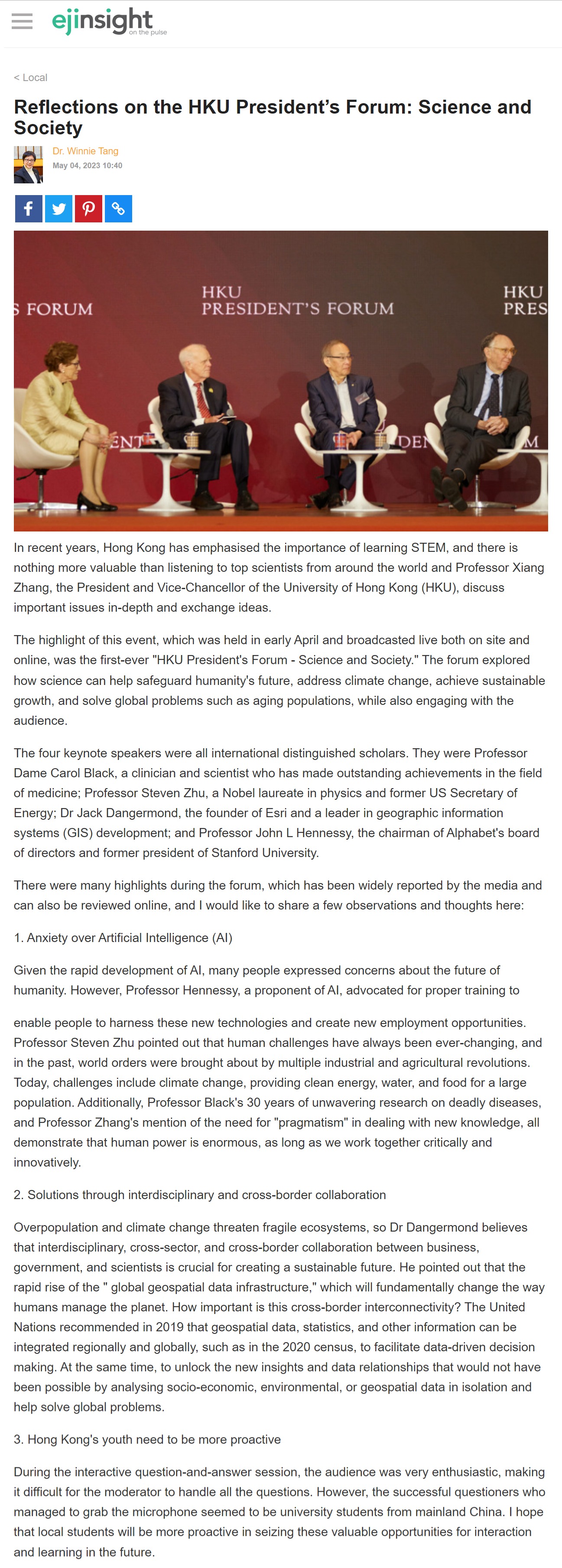網上版請按此

Reflections on the HKU President's Forum: Science and Society
In recent years, Hong Kong has emphasised the importance of learning STEM, and there is nothing more valuable than listening to top scientists from around the world and Professor Xiang Zhang, the President and Vice-Chancellor of the University of Hong Kong (HKU), discuss important issues in-depth and exchange ideas.
The highlight of this event, which was held in early April and broadcasted live both on site and online, was the first-ever "HKU President's Forum - Science and Society." The forum explored how science can help safeguard humanity's future, address climate change, achieve sustainable growth, and solve global problems such as aging populations, while also engaging with the audience.
The four keynote speakers were all international distinguished scholars. They were Professor Dame Carol Black, a clinician and scientist who has made outstanding achievements in the field of medicine; Professor Steven Zhu, a Nobel laureate in physics and former US Secretary of Energy; Dr Jack Dangermond, the founder of Esri and a leader in geographic information systems (GIS) development; and Professor John L Hennessy, the chairman of Alphabet's board of directors and former president of Stanford University.
There were many highlights during the forum, which has been widely reported by the media and can also be reviewed online, and I would like to share a few observations and thoughts here:
1. Anxiety over Artificial Intelligence (AI)
Given the rapid development of AI, many people expressed concerns about the future of humanity. However, Professor Hennessy, a proponent of AI, advocated for proper training to
enable people to harness these new technologies and create new employment opportunities. Professor Steven Zhu pointed out that human challenges have always been ever-changing, and in the past, world orders were brought about by multiple industrial and agricultural revolutions. Today, challenges include climate change, providing clean energy, water, and food for a large population. Additionally, Professor Black's 30 years of unwavering research on deadly diseases, and Professor Zhang's mention of the need for "pragmatism" in dealing with new knowledge, all demonstrate that human power is enormous, as long as we work together critically and innovatively.
2. Solutions through interdisciplinary and cross-border collaboration
Overpopulation and climate change threaten fragile ecosystems, so Dr Dangermond believes that interdisciplinary, cross-sector, and cross-border collaboration between business, government, and scientists is crucial for creating a sustainable future. He pointed out that the rapid rise of the " global geospatial data infrastructure," which will fundamentally change the way humans manage the planet. How important is this cross-border interconnectivity? The United Nations recommended in 2019 that geospatial data, statistics, and other information can be integrated regionally and globally, such as in the 2020 census, to facilitate data-driven decision making. At the same time, to unlock the new insights and data relationships that would not have been possible by analysing socio-economic, environmental, or geospatial data in isolation and help solve global problems.
3. Hong Kong's youth need to be more proactive
During the interactive question-and-answer session, the audience was very enthusiastic, making it difficult for the moderator to handle all the questions. However, the successful questioners who managed to grab the microphone seemed to be university students from mainland China. I hope that local students will be more proactive in seizing these valuable opportunities for interaction and learning in the future.
Dr. Winnie Tang
Adjunct Professor, Department of Computer Science, Faculty of Engineering; Department of Geography, Faculty of Social Sciences; and Faculty of Architecture, The University of Hong Kong